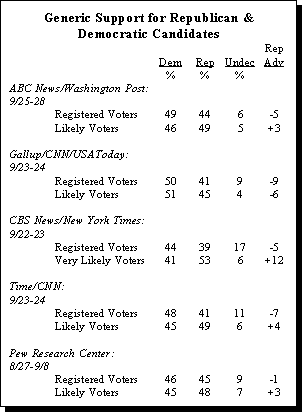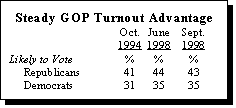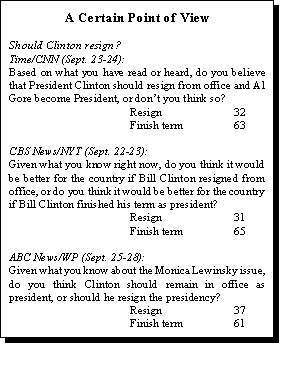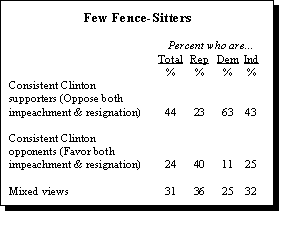
Several September polls show Republicans with more support than Democrats among likely voters in House races nationwide. But Pew Research Center trend studies find no clear evidence that the White House sex scandal has Democratic voters any more dispirited about voting this fall than they were earlier in the year or in 1994, the last mid-term election.
At a time of low interest in the off-year elections and uncertainty about the consequences of likely impeachment hearings, four of five recent national polls found a GOP lead in voting intentions for the House of Representatives. Only Gallup found more support for Democratic candidates than Republicans in September. In the other national polls, the Republican lead varied from 3 percentage points (Pew Research Center and ABC News/Washington Post) to 12 percentage points (CBS News/New York Times).
Republicans typically turn out to vote at higher rates than do Democrats, and the Republican advantage in each of these polls emerges when the sample is narrowed to a base of likely voters. But there is no evidence to suggest that the GOP has a bigger edge based on turnout than it had in 1994, and no evidence to suggest that Democrats are any less likely to vote than they were before the Starr report was released.

Although Pew’s trend studies suggest that turnout will be relatively low this year,1 the differential between the likelihood of Democrats and Republicans going to the polls is no greater than it was in 1994. In October 1994, Republicans outranked Democrats as likely voters by 10 percentage points. In September of this year, the difference is 8 percentage points.
The polls this year have found some fluctuation in voter preferences. At various times, both the Gallup and Pew surveys have shown larger Democratic leads than the most recent polls in voting intentions among registered voters. The lower numbers now may reflect the softening of President Clinton’s approval ratings, which are closely tied to congressional vote preferences.
Historically, the generic measure of partisan support has proven predictive of the popular vote, even in years like this when the number of open House seats (33) is low. For example, Gallup pre-election generic results in 1990 (29 open seats) and 1966 (24) mirrored the popular vote.2
Certain on Scandal
Americans have shown a great deal of conviction on the bottom line questions about the Clinton-Lewinsky affair. The public’s commitment to its point of view is reflected in three independent patterns in national opinion surveys:
- Various polling organizations use slightly different questions, yet get remarkably similar results.
- Responses to different questions within the same survey show most people are consistent in their thinking about what should happen to Clinton.
- When people are asked if they ever consider changing their views in order to end the controversy, most say no.
Three national surveys conducted the week of September 21, following the release of Clinton’s videotaped testimony, found remarkably similar divisions over whether Clinton should be impeached and removed from office. Although the question wording was slightly different in each poll, the results differed by less than 3 percentage points, showing just less than one third of Americans favoring impeachment and two-thirds opposed.

Questions on whether Clinton should resign also produced similar results across a number of survey organizations, again despite small variations in the way these questions were phrased. As many as seven national polls conducted in September found a majority of Americans saying Clinton should not resign from office. Most surveys found between 61% and 69% against resignation.
A September 17-18 Newsweek poll found the public far more narrowly divided: 46% said yes, 50% said no. However, the question wording differed substantially from other national surveys. The Newsweek question asked if Clinton should “consider” resigning over the Monica Lewinsky scandal, given “what he did to keep it secret.”
Internal Consistency
Not only is public opinion consistent across polling organizations, but the answers given to different scandal-related questions within the same survey also show that most people are consistently for or against Clinton. Three questions in a September 19-22 Pew Research Center poll asked respondents whether Clinton should resign and whether he should be impeached and removed from office under two possible conditions — if he lied under oath, and if he encouraged Monica Lewinsky to lie in her testimony.

Most respondents took consistent positions on all three questions: 44% of Americans said that Clinton should not resign and that they opposed impeachment under both circumstances; another 24% said Clinton should resign and consistently favored impeachment; just 31% offered mixed views on the questions. Democrats show striking consistency in their support of Clinton, with nearly two-thirds opposing impeachment and resignation. Republicans are divided, with only a slim plurality favoring both impeachment and resignation and an almost equal number holding mixed views.
No After Thoughts
Regardless of whether Americans think Clinton should resign or remain in office, those on both sides of the question have few doubts about their points of view. Among the 69% who think Clinton should stay in office, just 19% say they sometimes think it would be better if he resigned in order to end the controversy, while 80% do not. Similarly, among the 26% who think Clinton should resign, just 26% say they sometimes think it would be better for Congress to drop the whole matter, while the remaining 72% do not.


